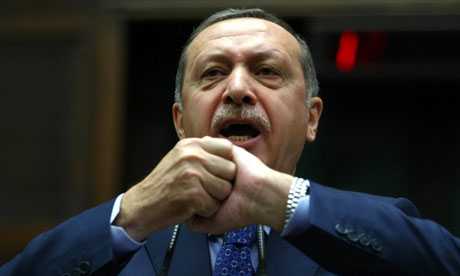Kemal Kilicdaroglu, chairman of the Republican People’s party, warns that PM is driving Turkey towards constitutional ‘disaster’
Simon Tisdall
guardian.co.uk, Friday 15 February 2013 12.33 GMT

Recep Tayyip Erdogan
Kemal Kilicdaroglu says Recep Tayyip Erdogan (pictiured) is determined to make himself president. Photograph: Adem Altan/AFP/Getty Images
Turkey’s prime minister is behaving like an “elected dictator” and inciting a constitutional crisis in a bid for greater personal power, the leader of the country’s main opposition party has warned.
Kemal Kilicdaroglu, chairman of the social democratic Republican People’s party (CHP), said Recep Tayyip Erdogan, premier since 2003, was determined to change the Turkish constitution to create an executive presidency, to which post he would switch after elections due next year.
“Turkey needs a new constitution to protect individual rights,” Kilicdaroglu said. The 1982 charter imposed after a military coup was out of date and at odds with Turkey’s EU ambitions, he said, but Erdogan’s plans ignored the need for a separation of powers, for instance by empowering the president to appoint judges.
“The prime minister is more and more authoritarian, unfortunately,” Kilicdaroglu said. “The sovereignty of fear is ubiquitous. No one can talk with ease on the telephone. Civil society is under pressure. The universities cannot express their view. The labour unions are completely silent. The media are fearful.
“There is not one single dissenting voice within his own party. The attempt to create an executive presidency is all about the concentration of power in a single hand. It will be a disaster for Turkey. It will cancel all the democratic gains Turkey has made.”
The confrontation over drafting a new constitution is expected to come to a head next month, after Erdogan’s ruling neo-Islamist Justice and Development party (AKP) indicated it would impose a guillotine on debate in the Turkish parliament’s all-party constitutional commission by the end of March. Kilicdaroglu has described the move as “blackmail”.
If agreement is lacking, the government needs the backing of at least four opposition MPs to push through the new charter and send it for ratification in a national referendum. The AKP has 326 seats in parliament. It requires between 300 and 367 votes to authorise a referendum, which it is confident it would win.
“If the parliament cannot do it, we will take the constitution to the people,” Erdogan said in a speech on Friday.
Alarm about Erdogan’s intentions intensified after he startled political observers by suggesting a deal with the Peace and Democracy party (BDP), which represents Kurdish interests.
The AKP government has jailed hundreds of BDP activists and supporters, including MPs and lawyers, under Turkey’s sweeping anti-terrorism laws, and several dozen jailed Kurds held a protracted hunger strike last year.
Kilicdaroglu said the manoeuvre, coupled with recently revived contacts with the jailed Kurdish leader Abdullah Ocalan, was a cynical attempt by Erdogan to buy votes while avoiding violence before the 2014 election season.
The BDP’s deputy parliamentary chair, Pervin Buldan, responded to Erdogan’s overture by setting conditions on her party’s co-operation, including an inclusive redefinition of citizenship and the lifting of all restrictions on using the Kurdish language in the public sphere. But Buldan did not rule out a deal.
Devlet Bahceli, leader of the rightwing Nationalist Movement party (MHP), another opposition group, denounced the AKP plan, telling the Hurriyet newspaper: “This is a declaration of war against Turkishness.” Turkey’s future was now in the hands of Ocalan’s outlawed Kurdistan Workers’ party (PKK), Bahceli said.
Kilicdaroglu was interviewed during a meeting at the House of Commons sponsored by Keith Vaz MP and chaired by Jo Glanville of English PEN, which promotes and defends freedom of expression.
Emma Reynolds MP, the shadow Europe minister, suggested opposition in some western European countries to Turkey’s EU membership bid had set back the cause of reform and encouraged a return to authoritarianism in Turkey. She expressed Labour’s support for its Turkish “sister party”.
Kilicdaroglu told the meeting that many writers and columnists critical of Erdogan’s rule had been “disenfranchised” – removed from their jobs – and that those still working were obliged to observe forms of self-censorship. He noted that more journalists were in jail in Turkey than in any other country.
“When the press is not free, the people are not free,” he said. “Whether this is a healthy environment in which to frame a new constitution is a matter I leave to you to decide.”
via Turkish opposition leader condemns ‘dictator’ Erdogan | World news | guardian.co.uk.